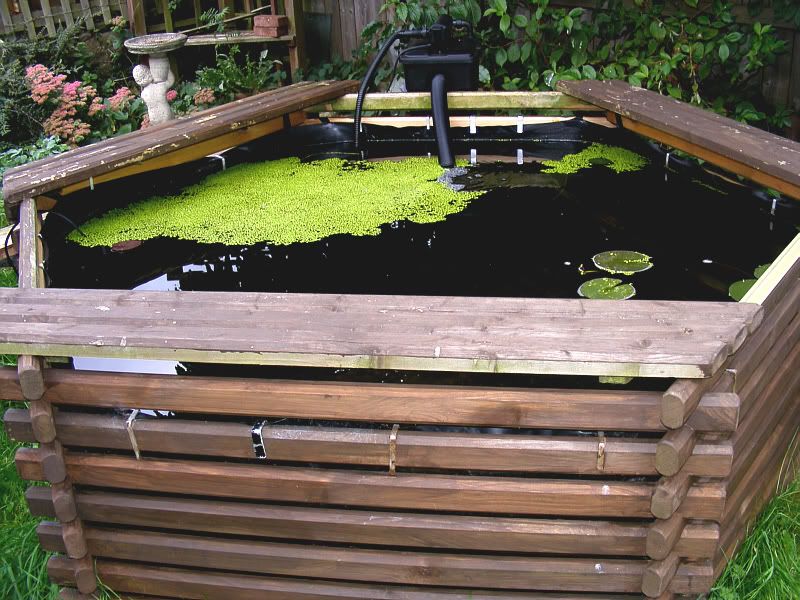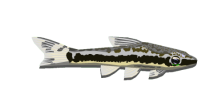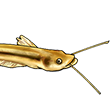Non-nitrogen water quality issues for small volume ponds?
- Carp37
- Posts: 596
- Joined: 21 Sep 2007, 13:08
- My cats species list: 16 (i:7, k:0)
- My aquaria list: 7 (i:6)
- My BLogs: 2 (i:0, p:75)
- Location 2: Aughton UK
- Interests: fish, fishing, fossils, evolution/taxonomy, films
Non-nitrogen water quality issues for small volume ponds?
Hi- apologies for the incomplete title, I ran out of characters. I have a 450 gallon (UK) outdoor pond with 6 juvenile goldfish and 2 juvenile carp (plus 4 roach fry and an indeterminate number of sticklebacks) in my garden. Other than topping up any evaporation, I don't do any routine water changes. Nitrate levels show (apparently, presumably not absolutely literally) zero- far less than my tap water. There are aquatic oxygenating plants plus floating duckweed in the pond which presumably take up nitrate, so a low nitrate level is believable.
However, I was wondering if there's any reason why I should periodically refresh the water- are there any waste products that build up in what is, I suppose, a semi-closed system at times of low rainfall? I've noticed that there is a moderate build-up of froth inside the canister filter- is this due to protein? The fish have considerably greater appetites than previously and have grown considerably over the past month.
The reason for this post is that a couple of the goldfish appear to be carrying fungus on their fins- they were fine on Thursday, and since Friday have patches of white. It's possible they've been trying to spawn, although a month ago I'd have certainly said they were too small.
However, I was wondering if there's any reason why I should periodically refresh the water- are there any waste products that build up in what is, I suppose, a semi-closed system at times of low rainfall? I've noticed that there is a moderate build-up of froth inside the canister filter- is this due to protein? The fish have considerably greater appetites than previously and have grown considerably over the past month.
The reason for this post is that a couple of the goldfish appear to be carrying fungus on their fins- they were fine on Thursday, and since Friday have patches of white. It's possible they've been trying to spawn, although a month ago I'd have certainly said they were too small.
Last edited by Carp37 on 28 Jun 2010, 13:59, edited 1 time in total.
Megalechis thoracata, Callichthys callichthys, Brochis splendens (and progeny), Corydoras sterbai, C. weitzmani, CW044 cf. pestai, CW021 cf. axelrodi, Pterygoplichthys gibbiceps, Ancistrus cf. cirrhosus (and progeny), Panaque maccus, Panaque nigrolineatus, Synodontis eupterus
- MatsP
- Posts: 21038
- Joined: 06 Oct 2004, 13:58
- My articles: 4
- My images: 28
- My cats species list: 117 (i:33, k:0)
- My aquaria list: 10 (i:8)
- My BLogs: 4 (i:0, p:97)
- Spotted: 187
- Location 1: North of Cambridge
- Location 2: England.
Re: Non-nitrogen water quality issues for small volume ponds
Interesting question. Aside from the nitrogen uptake by plants, I would expect that the substrate being a bit deeper in the pond than in your average aquarium, which will have denitrifying bacteria in it.
--
Mats
--
Mats
-
Bas Pels
- Posts: 2913
- Joined: 21 Dec 2006, 20:35
- My images: 1
- My cats species list: 28 (i:0, k:0)
- Spotted: 8
- Location 1: the Netherlands
- Location 2: Nijmegen the Netherlands
- Interests: Central American and Uruguayan fishes
Re: Non-nitrogen water quality issues for small volume ponds
@ fungus on your goldfish - You are certain it is not related to any intentions for spawning? I once read cyprinid males can grow on the head something to impress the females which looks like fungus
Genetally speaking, apart from nitrogen related issues, there is also phosphorus (which is also taken up by the plants) some potassium (idem) and than there are feromones.
Feromones are signal compounds send by individuals to influence others. Alarm is 1 example, grow influencers is another. however, they decay rapidly
Personally, I got 10 600 liter ponds in my garden (600 liters is less than half of 350 UK gallons) with cich lids, tetras, life bearers and some catfish in them. I don't change water in them, but I do (have to) replace evaporated water (this summer). I used this system for 4 years now, and every year I have young fishes, good growing fishes and all fishes are very handsome indeed.
Genetally speaking, apart from nitrogen related issues, there is also phosphorus (which is also taken up by the plants) some potassium (idem) and than there are feromones.
Feromones are signal compounds send by individuals to influence others. Alarm is 1 example, grow influencers is another. however, they decay rapidly
Personally, I got 10 600 liter ponds in my garden (600 liters is less than half of 350 UK gallons) with cich lids, tetras, life bearers and some catfish in them. I don't change water in them, but I do (have to) replace evaporated water (this summer). I used this system for 4 years now, and every year I have young fishes, good growing fishes and all fishes are very handsome indeed.
cats have whiskers
- Carp37
- Posts: 596
- Joined: 21 Sep 2007, 13:08
- My cats species list: 16 (i:7, k:0)
- My aquaria list: 7 (i:6)
- My BLogs: 2 (i:0, p:75)
- Location 2: Aughton UK
- Interests: fish, fishing, fossils, evolution/taxonomy, films
Re: Non-nitrogen water quality issues for small volume ponds
thanks for the responses Mats, Bas Pels.
@Bas Pels- I'm sure it's not spawning tubercles, as the white patches are on back of the dorsal fin of the worst affected fish, and on the pectoral fin of the less affected fish. I'm not 100% sure it's fungus as the pond is a bit cloudy at the moment- I had an infestation of blanket weed (single-celled algae which grows in very long strands) which I didn't treat (I did remove large quantities of the stuff), which seems to be dying off to produce lots of dead/dying algal matter in the pond, at a faster rate than the filter can trap it. However, I can't think of anything else that looks that white on a fish, but I was shocked at the amount of fungus that appeared overnight.
@Bas Pels- I'm sure it's not spawning tubercles, as the white patches are on back of the dorsal fin of the worst affected fish, and on the pectoral fin of the less affected fish. I'm not 100% sure it's fungus as the pond is a bit cloudy at the moment- I had an infestation of blanket weed (single-celled algae which grows in very long strands) which I didn't treat (I did remove large quantities of the stuff), which seems to be dying off to produce lots of dead/dying algal matter in the pond, at a faster rate than the filter can trap it. However, I can't think of anything else that looks that white on a fish, but I was shocked at the amount of fungus that appeared overnight.
Megalechis thoracata, Callichthys callichthys, Brochis splendens (and progeny), Corydoras sterbai, C. weitzmani, CW044 cf. pestai, CW021 cf. axelrodi, Pterygoplichthys gibbiceps, Ancistrus cf. cirrhosus (and progeny), Panaque maccus, Panaque nigrolineatus, Synodontis eupterus
- L number Banana
- Posts: 2140
- Joined: 06 Jan 2009, 18:52
- I've donated: $5.00!
- My articles: 1
- My cats species list: 13 (i:0, k:0)
- My aquaria list: 1 (i:0)
- Location 2: Kingston, ON, Canada
Re: Non-nitrogen water quality issues for small volume ponds
Haven't seen that on my goldfish when they were breeding in the pond so no help for you there, sorry.
I made a stent sort of thing for my big pond that allows water to run out when it rains heavily. I guess this is my water change mechanism. This year, I started the pond with all the guck from my filters and I didn't even have a spring algae bloom. Give the pond more cover if your algae ever gets out of control again. I once used a huge piece of styrofoam insulation floating on half of the pond to get a quick clearing.
So I don't refresh the water but I don't do it in one of my fish tanks either. So far it's the best water quality but as this experiment goes on, I'm keeping an eye out for metals or whatever accumulation. I take some water to the LFS once a month to see if there's any higher amounts of things that don't evaporate. In your pond, there could be many plants that take up heavy metals or other nasties. I only know that willow does a good job at that. Can you get a thorough test at your fish store? Would be interesting to see near the end of the season.
Where's the pics?
I made a stent sort of thing for my big pond that allows water to run out when it rains heavily. I guess this is my water change mechanism. This year, I started the pond with all the guck from my filters and I didn't even have a spring algae bloom. Give the pond more cover if your algae ever gets out of control again. I once used a huge piece of styrofoam insulation floating on half of the pond to get a quick clearing.
So I don't refresh the water but I don't do it in one of my fish tanks either. So far it's the best water quality but as this experiment goes on, I'm keeping an eye out for metals or whatever accumulation. I take some water to the LFS once a month to see if there's any higher amounts of things that don't evaporate. In your pond, there could be many plants that take up heavy metals or other nasties. I only know that willow does a good job at that. Can you get a thorough test at your fish store? Would be interesting to see near the end of the season.
Where's the pics?
Racing, shoes and fish. Nothing else matters. Oh, and bacon.
- Carp37
- Posts: 596
- Joined: 21 Sep 2007, 13:08
- My cats species list: 16 (i:7, k:0)
- My aquaria list: 7 (i:6)
- My BLogs: 2 (i:0, p:75)
- Location 2: Aughton UK
- Interests: fish, fishing, fossils, evolution/taxonomy, films
Re: Non-nitrogen water quality issues for small volume ponds
Hi LNB- I've posted this picture before, when I was asking whether or not to add a substrate to the pond, but I'll post it again:L number Banana wrote:Where's the pics?

That picture was taken last autumn- since then the duckweed has really taken off, requiring quite heavy gardening to remove it... The pond type certainly wouldn't be my first choice of pond, but as a freebie gift from my uncle I certainly wasn't going to turn it down.
So, the consensus seems to be that there shouldn't be anything too bad building up, which was my thought, but I wasn't too sure, being more of a biologist than biochemist by training- thanks for everyone's responses.
Megalechis thoracata, Callichthys callichthys, Brochis splendens (and progeny), Corydoras sterbai, C. weitzmani, CW044 cf. pestai, CW021 cf. axelrodi, Pterygoplichthys gibbiceps, Ancistrus cf. cirrhosus (and progeny), Panaque maccus, Panaque nigrolineatus, Synodontis eupterus




